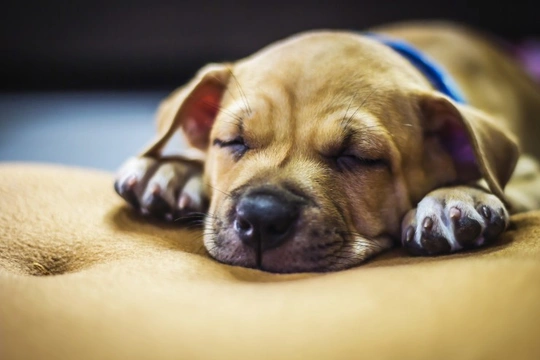
Should you try to keep your puppy awake during the day so they sleep at night?
As anyone who has ever had a baby will know, youngsters tend to sleep and wake up at all sorts of odd hours, which means that most new parents go through a long period of nights of broken sleep and keeping odd hours in the first few months. Parents also know that if their child gets sleepy and naps during the day, this is apt to lead to night-time wakefulness, and so trying to avoid naps and keep the child awake during the daytime is one approach to helping them to sleep through the night.
Having a new puppy often comes accompanied by many of the same challenges – puppies spend a lot of their time sleeping, and will often take several naps during the day as they get worn out very quickly. Night-time wakefulness is a common puppy issue, and if your pup seems to spend half the night crying, pacing about or otherwise making a fuss, you may be wondering if you should try to keep them awake during the day so that they are ready to sleep by bedtime.
However, trying to stop your puppy from napping, or deliberately waking them up from a nap to avoid restlessness at night isn’t really a good approach to take – pups sleep a lot because they need to, and preventing them from resting and recharging when they are tired can lead to grumpiness, and even hamper their development.
That said, there are a number of things that you can do to try to readjust your pup’s body clock and begin to introduce them to sleeping through the night, without interfering with their natural requirements. Read on to learn about some of the things that you can do to help your puppy to sleep through the night, and reduce wakefulness during the dark hours.
Young puppies and their sleep patterns
If you buy or adopt a puppy that has previously been living with their dam and littermates, their sleeping patterns when they come to live with you are likely to involve periods of wakefulness and sleep staggered throughout the day rather than a night of sleep and the days spent largely awake.
Introducing a puppy to the concept that they are expected to seep for eight hours at night is of course rather different to this, and it takes some time to adjust to, both physically and in terms of their natural body clocks.
Over time, as your pup gets used to the routine of your home and when their owners are active, their patterns of sleep and being awake will usually begin to fall in line with that of your home, but if you don’t establish a routine for your pup early on, this may not be the case.
Exercise and activity
A puppy that is full of beans and doesn’t get enough opportunities for play and exercise won’t sleep very well, and will tend to be restless and continually looking for new things to entertain themselves with.
It is important not to over exercise your pup or cause them to overexert themselves, but you should also ensure that you are fulfilling all of their needs for mental and physical activity, and that you adapt as your pup gets older and their needs grow and change.
When you feed your dog
When you feed your pup can have a direct impact on how well they settle down at night, not least because dogs usually need to toilet a certain period of time after their meals.
Pups benefit from being fed two or three small meals at set periods throughout the course of the day, and their last meal shouldn’t be too close to bed time, so they will have less chance of needing to get up to toilet during the night.
Toileting considerations
The last thing you should do before you put your pup down for the night is offer them the opportunity to use the toilet. If your pup tends to wake up and become restless in the middle of the night, this may be because they need to go outside – and even in older puppies and adult dogs, just like some people, some dogs need to use the loo in the night!
Try to get your pup into a routine of doing their business just before bed, and if necessary, alter their feeding times to enable this.
A set routine
Having a set routine of walks, mealtimes, toileting opportunities and sleeping cycles helps dogs to feel secure and confident, as well as reducing the incidence rate of problems such as erratic sleep patterns and being awake at night.
Where and how your puppy sleeps
Finally, whilst many pups will cry for a while at night when they first move in with you because the situation is strange and they are still getting used to things, if your pup’s bed or where they sleep is uncomfortable, too cold, or otherwise unsuitable, they won’t sleep well.
Try to pick a quiet, comfortable area that your pup feels safe in to set up their bed, and ensure it is out of drafts or cold areas.



